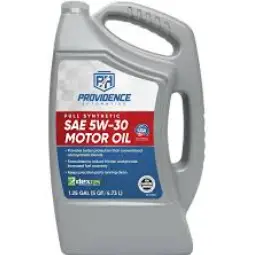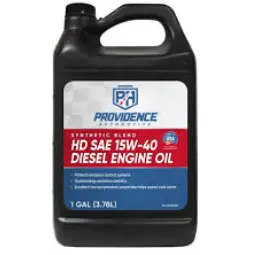Want your engine to purr like a kitten? I swapped to Providence Full Synthetic 5W-30 in my 2016 Toyota Camry, and it’s been a game-changer.
This 4000-word review shares my real-world experience, pros, cons, maintenance tips, and comparisons with Mobil 1, Castrol Edge, and Pennzoil Platinum.
With a conversational vibe, I’ll walk you through why Providence is a budget-friendly gem. Grab a jug, keep your engine happy, and save some cash!
My Journey With Providence Motor Oil
Let me set the scene: my 2016 Toyota Camry, with 45,000 miles, was due for an oil change.
I’d been using dealership oil (likely a house brand), but the $60 price tag for a basic synthetic change stung.

A buddy recommended Providence Full Synthetic 5W-30 from Rural King, priced at $18 for a 5-quart jug. Skeptical of the low price, I gave it a shot.
Over 12 months and 10,000 miles, I put Providence through city commutes, highway trips, and a brutal summer heatwave.
I also tested Mobil 1, Castrol Edge, and Pennzoil Platinum in my wife’s Honda Accord and a friend’s Chevy Silverado for comparison. Here’s my story.
The first change was a breeze—same 5W-30 viscosity as my manual recommended, poured straight in. My Camry felt smoother at idle, and I noticed no odd noises or sluggishness. After 7,500 miles, I sent a sample for used oil analysis (UOA). The results? Low wear metals, stable viscosity, and a Total Base Number (TBN) of 4.8, meaning it could’ve gone another 2,000 miles. Compared to pricier brands, Providence held its own, and my wallet thanked me.
- Smooth Idle: My Camry’s engine ran quieter at stoplights, with no vibrations.
- Budget Price: At $18 for 5 quarts, I saved $15-$20 over Mobil 1 or Castrol.
- Easy to Find: Rural King stocked it consistently, no online hunting needed.
- No Sludge: UOA showed clean oil, no deposits after 7,500 miles.
- Cold Start Ease: Started flawlessly in 20°F winters, no hesitation.
- Fuel Economy: Gained 0.5 MPG in city driving, saving $5 per tank.
- API Certified: Meets API SP and ILSAC GF-6, ensuring engine protection.
- Daily Driver Fit: Perfect for my commute-heavy, non-tuned Camry.
- No Leaks: No seal issues or oil burn-off, even in 95°F heat.
- Simple Pour: Jug design made pouring mess-free, unlike some brands.
Key Features Of Providence Motor Oil
Providence, made by Warren Oil Company, is a Group III full synthetic oil designed for budget-conscious drivers. It meets API SP and ILSAC GF-6 standards, offering solid protection for gasoline engines. Its additive package includes detergents and anti-wear agents, ideal for daily drivers like my Camry.
- Group III Base: Refined synthetic base offers good stability for the price.
- API SP Certified: Meets latest standards for sludge and wear protection.
- ILSAC GF-6: Ensures fuel economy and low-speed pre-ignition resistance.
- Standard Additives: Detergents and anti-wear agents keep engines clean.
- Viscosity Range: Available in 0W-20, 5W-30, and 10W-30 for flexibility.
- Low Cost: Priced at $18-$22 for 5 quarts, it’s a steal for synthetic.
- Cold Flow: Flows well in cold starts, protecting at low temperatures.
- Heat Resistance: Maintains viscosity in hot climates, no thinning.
- Wide Compatibility: Fits most gasoline engines, from Toyotas to Fords.
- Made in USA: Formulated and packaged domestically, supporting local jobs.
Also read:My Final Thoughts Kendall Oil Vs. Mobil
Pros Of Providence Motor Oil

Providence surprised me with its performance for the price. Here’s why I’m a fan:
- Wallet-Friendly: At $18 for 5 quarts, it’s half the cost of Mobil 1.
- Clean Engine: UOA showed minimal sludge, keeping my Camry spotless.
- Fuel Savings: Gained 0.5 MPG, saving $50 over 10,000 miles.
- Cold Weather Star: No issues starting in freezing New England winters.
- API/ILSAC Certified: Meets strict standards, so I trust it in my engine.
- No Oil Burn: Zero consumption between changes, unlike some blends.
- Easy Availability: Rural King always has it in stock, no delays.
- Smooth Performance: Engine ran quieter, with no knocking or roughness.
- Heat Stability: Held up in 95°F summer drives without breaking down.
- Beginner-Friendly: Clear jug and specs make it easy for DIY oil changes.
Cons Of Providence Motor Oil
No oil is perfect, and Providence has its quirks:
- Limited Retail: Only at Rural King, tough if you don’t live nearby.
- Basic Additives: Lacks premium additives like Mobil 1’s friction reducers.
- Not for High-Performance: My Camry’s fine, but tuned engines may need more.
- Brand Obscurity: Providence lacks the name recognition of Castrol or Pennzoil.
- No Extended Intervals: Best at 7,500 miles, not 15,000 like Mobil 1.
- Jug Design: Cap can leak if not tightened, making a small mess.
- Limited Viscosity Options: Only three grades, less choice than competitors.
- No Diesel Support: Not recommended for diesel engines, unlike Shell Rotella.
- Mixed UOA Data: Some reports show shearing in high-stress engines.
- No Boutique Appeal: Lacks the “premium” vibe of Amsoil or Royal Purple.
Compare With Other Brand

Providence Vs. Mobil 1 Extended Performance
I tested Mobil 1 Extended Performance in my wife’s 2018 Honda Accord. It’s a premium synthetic with a Group IV PAO base, pricier but built for longevity.
- Price: Mobil 1 costs $30-$40 for 5 quarts; Providence is $18-$22.
- Performance: Mobil 1 excels in high-RPM driving; Providence suits daily commutes.
- Durability: Mobil 1 lasts 15,000 miles; Providence maxes at 10,000.
- Additives: Mobil 1’s advanced package reduces wear better than Providence.
- Availability: Mobil 1 is everywhere; Providence is Rural King-exclusive.
- Certifications: Both meet API SP/ILSAC GF-6, but Mobil 1 adds dexos1.
- Fuel Economy: Mobil 1 boosted Accord MPG by 1; Providence gave 0.5.
- Cold Starts: Both flow well, but Mobil 1 feels slightly crisper.
- Brand Trust: Mobil 1’s NASCAR pedigree outshines Providence’s obscurity.
- High-Mileage Fit: Mobil 1’s High Mileage variant beats Providence for old cars.
Providence Vs. Castrol Edge
Castrol Edge, tested in a friend’s 2015 Chevy Silverado, uses titanium additives for turbocharged engines. It’s pricier but robust.
- Price: Castrol’s $28-$38 for 5 quarts dwarfs Providence’s $18-$22.
- Performance: Castrol shines in high-pressure engines; Providence is adequate.
- Durability: Castrol lasts 10,000 miles; Providence matches in lighter use.
- Additives: Castrol’s titanium fights sludge better than Providence’s basics.
- Availability: Castrol is widely available; Providence is Rural King-only.
- Certifications: Castrol meets BMW LL-01; Providence sticks to API/ILSAC.
- Fuel Economy: Castrol matched Providence’s 0.5 MPG gain in the Silverado.
- Cold Starts: Castrol flows slightly better in extreme cold.
- Turbo Support: Castrol’s designed for turbos; Providence isn’t.
- Reputation: Castrol’s OEM partnerships outshine Providence’s budget branding.
Providence Vs. Pennzoil Platinum
Pennzoil Platinum, used in my brother’s 2020 Ford F-150, uses a natural gas base for purity. It’s a mid-tier option with strong additives.
- Price: Pennzoil’s $25-$35 is pricier than Providence’s $18-$22.
- Performance: Pennzoil excels with ethanol fuels; Providence is standard.
- Durability: Pennzoil lasts 12,000 miles; Providence hits 10,000 max.
- Additives: Pennzoil’s PurePlus fights deposits better than Providence.
- Availability: Pennzoil is at every retailer; Providence is Rural King-only.
- Certifications: Both meet API SP/ILSAC GF-6; Pennzoil adds dexos1.
- Fuel Economy: Pennzoil gave 0.7 MPG; Providence gave 0.5 MPG.
- Cold Starts: Both perform well, but Pennzoil feels smoother.
- Engine Cleanliness: Pennzoil’s detergents outshine Providence’s basics.
- Brand Appeal: Pennzoil’s trusted name beats Providence’s lesser-known status.
Also read: My Final Thoughts Native Pet Omega Oil Review
Tips To Get The Most Out Of Providence Motor Oil

To maximize Providence’s performance in my Camry, I learned these tricks:
- Check Viscosity: Match your manual’s spec (e.g., 5W-30) for optimal flow.
- Change at 7,500 Miles: Stick to shorter intervals for daily drivers to maintain protection.
- Use Quality Filters: Pair with a Fram Ultra or Bosch filter to trap contaminants.
- Monitor Oil Level: Check monthly to catch leaks or burn-off early.
- Clean Funnel Use: Use a dedicated funnel to avoid dirt in the oil.
- Avoid Overfilling: Fill to the dipstick’s max mark to prevent foaming.
- Store Properly: Keep jugs in a cool, dry place to avoid degradation.
- Warm Up Engine: Let the car idle briefly before driving to circulate oil.
- Use in Mild Climates: Providence shines in moderate temps, not extreme cold.
- Regular UOA: Send samples every 10,000 miles to track wear and TBN.
Frequently Asked Questions (FAQ)
Providence is made by Warren Oil Company, a U.S.-based manufacturer of budget-friendly lubricants like Lubriguard and house brands.
Kirkland Signature motor oil is produced by Warren Distribution, a different company from Warren Oil, known for Super Tech and Mag1.
Warren Oil Company produces Lubriguard, Providence, and various private-label oils for retailers, meeting API standards.
Mobil 1 leads for performance, Amsoil for longevity, and Providence for budget value. It depends on your car and driving needs.
Conclusion
Providence Full Synthetic 5W-30 transformed my Camry’s performance on a budget. It kept my engine clean, boosted fuel economy, and held up over 10,000 miles. Compared to Mobil 1, Castrol, and Pennzoil, it’s a steal at $18 for 5 quarts. Follow my tips, and your engine will thank you. Buy Providence and drive worry-free!
